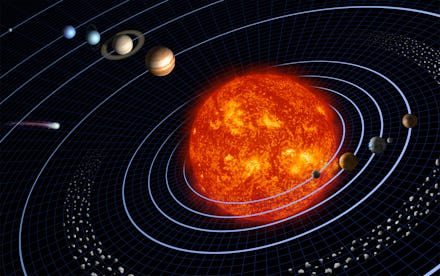Planet 10? Scientists may have discovered a hidden planet in our solar system

Our solar system got a little bit smaller in 2006, when Pluto lost its designation as a planet. Now, it turns out our planetary count may be even higher than previously thought.
A new study from researchers at the University of Arizona's Lunar and Planetary Laboratory revealed the possible existence of a previously undiscovered "planetary mass object" at the far reaches of our solar system. The potential planet is predicted to have a mass somewhere between Mars and Earth.
Lead researchers Kathryn Volk and Renu Malhotra determined the planet's possible presence because of its effect on the orbit of objects in the Kuiper Belt, an area of the solar system that starts beyond Neptune and ends at a distance of 55 times the distance between Earth and the sun, the New Scientist explained.
The belt is far enough away from the gravitational pull of the planets that its objects can orbit on different angles than the plane on which Earth and other planets orbit. The warped orbit of the most distant objects in the belt suggests there's a planetary body controlling it, the researchers posit.
"The most likely explanation for our results is that there is some unseen mass," Volk, the lead author of the study, said in a statement. "According to our calculations, something as massive as Mars would be needed to cause the warp that we measured."
Though the solar system got bumped down to eight planets when Pluto was downgraded, this new discovery could be planet number 10, rather than nine. The presence of a possible ninth planet — known as "Planet Nine" or "Planet X" — was discovered in early 2016.
That possible planet, whose reported mass is approximately 10 times that of Earth, had its existence recently called into question, however, with the release of a new study.
Some critics are questioning the University of Arizona study and the potential 10th planet's presence.
"I am dubious that a planet so close and so bright would have remained unnoticed," Alessandro Morbidelli of the Côte d’Azur Observatory in Nice, France, told the New Scientist.
Nevertheless, the study's authors remain confident in their findings.
"It would have to be quite a fluke for this to not be a real effect," Volk said to the New Scientist. "We think there is a real signal there and this implies an additional planet."